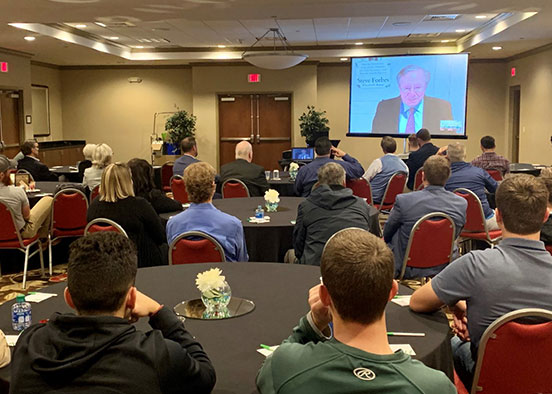Whether it’s described as dough, bucks, Benjamins or moolah everyone knows what money is, but the currency we depend on today has a history of highs and lows. An average Monday evening turned into a rare opportunity as Florida Gulf Coast University students sat down to talk about money with one of the nation’s largest publishing executives, Steve Forbes.
Chairman of Forbes Media and editor-in-chief of the business magazine that bears the family name, Forbes was also a candidate in the 1996 and 2000 Republican presidential primaries. He joined the conversation inside a Fort Myers hotel conference room via Skype, answering questions about money and its value.
“Only three other campuses in the country are getting the same experience. We were one of the top four because the students had a demonstrated track record of doing really great things,” explained BB&T Distinguished Associate Professor of Free Enterprise at FGCU Victor Claar, Ph.D.
The FGCU student group Eagles for Liberty, a chapter of the national organization Students for Liberty, hosted the event. Eagles for Liberty caught Forbes’ attention after being named the 2018-19 North American Chapter of the Year.

“He is someone we talk about in political science classes and econ classes, so to hear from him was a great opportunity,” said FGCU junior Brett McFarlane.
The question-and-answer session happened after a group of about 30 people screened the PBS documentary “In Money We Trust?” The film, which was released earlier this year, answers the question “what is money?” and is based on the book “Money: How the Destruction of the Dollar Threatens the Global Economy — And What We Can do About It,” coauthored by Forbes and Elizabeth Ames. The film echoes lessons taught in several of Claar’s macroeconomics courses.
“My students and I were smiling at each other because I knew they recognized stuff that I had told them, so that was really fun,” said Claar.
The documentary takes viewers from ancient times to present day and explains how the invention of money thousands of years ago created a measure of value and trust between strangers. Several distinguished financial experts also discuss what money is, the creation of inflation and the problems with financial instability through the decades.
“The takeaway is that money isn’t just money. Money has significance. It’s important to have it and it’s also important to make sensible financial decisions,” said Claar, “But most of all, understanding how money helps us do great things for ourselves, for each other, and for the greater good, that ultimately is the big takeaway.”
After the hourlong documentary, students and attendees sat down in front of a webcam asking Forbes questions ranging from his opinion of the gold standard to life advice in leading a successful career.
“It’s great for students to hear from someone as successful as him say, ‘Hey, this is what you need to do or should do to be a successful entrepreneur, businessman, students or just overall person in life,’” said McFarlane.
McFarlane is majoring in history and political science. After introducing Forbes, he also asked the first question about the Federal Reserve and the use of the Philips curve, an economics theory that claims with economic growth comes inflation. McFarlane says having that exchange was valuable.
“I think it’s a really great opportunity for everyone to hear about such a pertinent issue, something that affects everyone, this kind of idea of having a stable, monetary currency,” explained McFarlane.
More information about that film, including where to watch, can be found at inmoneywetrust.org.